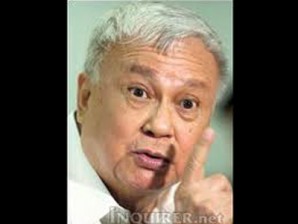Supreme Court coco levy ruling ‘too late, too obscure’—Sen. Arroyo
The Supreme Court ruling that the government owned a portion of the multibillion-peso coconut levy funds collected from farmers during the Ferdinand Marcos regime was “too obscure,” “too late” and “too little,” Senator Joker Arroyo said yesterday.
Arroyo rued that the court ruling was unclear over how the coconut farmers, who had been forcibly levied taxes by the government under the Marcos dictatorship, could benefit from it.
“Where does the reduced 24 percent go?” he said of the block of shares in San Miguel Corp. (SMC) registered under the Coconut Industry Investment Fund (CIIF) and its holding companies, and held in trust by the government for coconut farmers. “To the government or to the farmers? That is the question.”
This was originally 27 percent but was reduced to 24 percent after it was diluted with the investment of Japanese brewer Kirin in SMC. The remaining 20 percent claimed by businessman Eduardo “Danding” Cojuangco had earlier been ruled by the court as having been legally acquired by the uncle of President Benigno Aquino III.
3 decades of litigation
Article continues after this advertisementWorse, Arroyo said that the farmers had not benefited a single cent from the levy funds after more than three decades of litigation, while the other camp managed to set up the United Coconut Planters Bank (UCPB) out of these funds.
Article continues after this advertisement“Is it fair? Not at all,” he said of the court ruling.
“To begin with, the coconut levy fund was used to set up what would later be the UCPB, which in turn was used to buy 14 coco mills which bought 47 percent of San Miguel shares or the dominant owner of the company. That took place during martial law.”
“Did the coco farmers benefit from the levy imposed on them 35 years ago? Not at all. Zero,” he added.
The court, voting 11-0, last Tuesday affirmed the Sandiganbayan’s 2004 ruling awarding the 24-percent block of shares in SMC to the government.
The 24-percent block of shares was part of the 47-percent block of shares sequestered by the Presidential Commission on Good Government (PCGG) on suspicion that these were acquired illegally by Marcos and his associates using the coco levy funds.
Old, tired and dead
Arroyo indicated that however one looked at it, neither ruling benefited the farmers.
“First, the Sandiganbayan ruled that 20 percent of the 47 percent was not owned by the coco farmers. They were owned by Danding Cojuangco, the Sandiganbayan said in 2007, leaving the coco farmers with 27 percent. Danding with 20 percent said he was not interested in the other 27 percent. After all, he had by then control of San Miguel,” Arroyo said.
“The 27 percent was further reduced to 24 percent and the government asked that the shareholdings be converted from common to preferred shares,” he added. Each of the 700 million shares was pegged at P75 each after the conversion ordered by the court, or around P52 billion.
The senator wondered why the courts took 35 years to rule on the coconut levy funds, from which the farmers did not benefit but “made others rich.”
“Why did it take such a long long time?” he said. “Someone in the past five and present administrations owe the coconut farmers, who have grown tired and weary, old and dead, an explanation.”
The coco levy funds were monies collected from the coco levy, a forced tax that Marcos imposed on the farmers from 1973 to 1982. Marcos appointed Cojuangco as the administrator of the funds.
The government claimed that this gave Cojuangco and his associates the means to buy coconut trading firms, oil mills, buy a bank, the UCPB, and shares of stocks in SMC.
These assets were placed in the name of the CIIF, a holding company owned by six oil mills and controlled by Cojuangco. The assets were held by the UCPB, the CIIF administrator.
Victory for farmers
PCGG Chairman Andres Bautista, in a statement, called the ruling “a measure of justice” and vowed to use the fund to rehabilitate the coconut industry and alleviate the plight of the farmers, described as among the “poorest of the poor” Filipinos.
“The court’s unanimous vote of 11-0 is a resounding victory for our country’s coconut farmers. The 24-percent SMC shares represent a tremendous potential infusion that can prop up the coconut industry as a whole, and improve the lives of our country’s small coconut farmers, specifically,” Bautista said.
Randall Echanis, deputy secretary general of the Kilusang Magbubukid ng Pilipinas, said the court decision strengthened the plunder case the group had filed against Cojuangco, Senate President Juan Ponce Enrile and the late Ma. Clara Lobregat.
Enrile was then chairman of the Philippine Coconut Authority (PCA); Lobregat was head of the Coconut Producers Federation. The three controlled the industry during the Marcos years.
Far from over
In a statement, Echanis vowed that as long as the coco levy funds remained stuck in SMC and under the control of Cojuangco, “the fight to recover the funds is far from over.”
Euclides Forbes, current PCA administrator, said the quickest way to revitalize the industry using the levy funds was to establish a multi-agency trust fund. He said bills had been filed in Congress on this proposal, but added that the President could also issue an executive order setting up this mechanism. With reports from Tarra Quismundo, Kristine L. Alave and Delfin Mallari, Inquirer Southern Luzon
